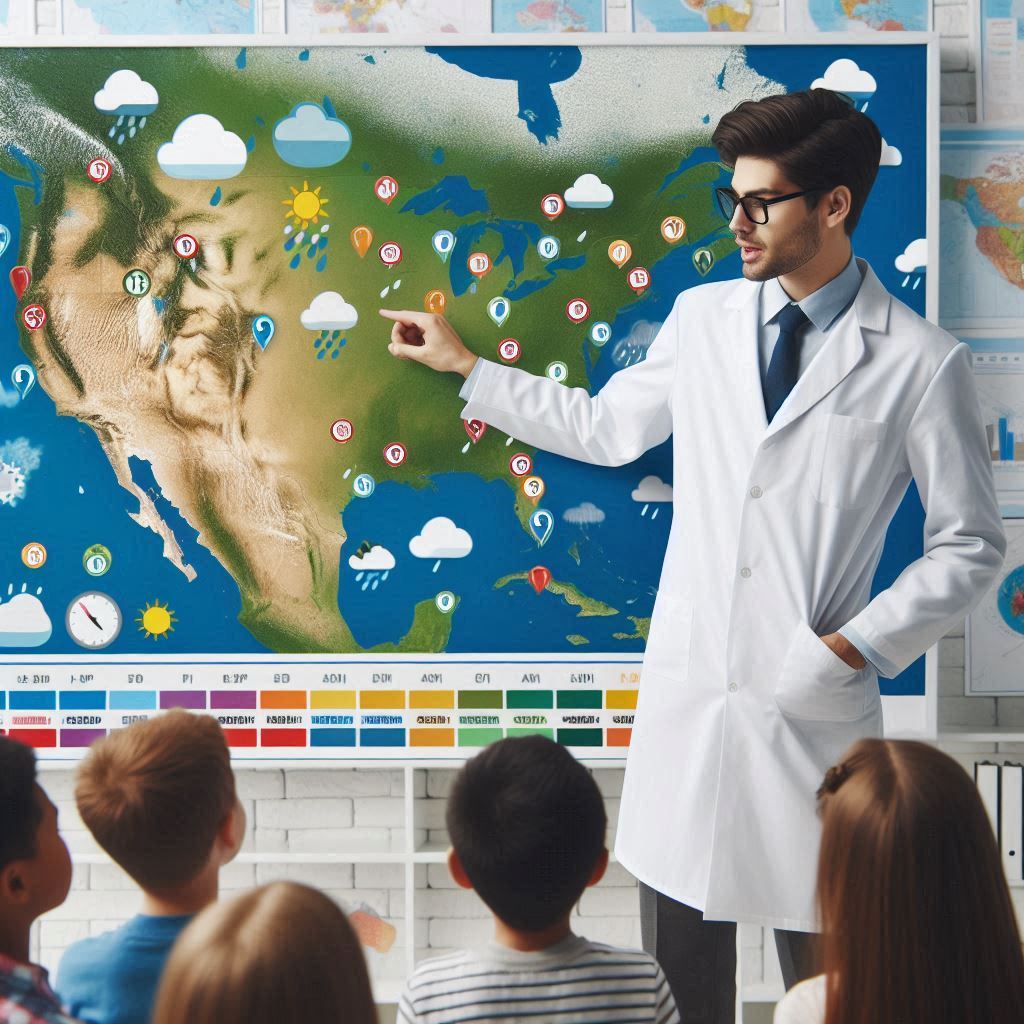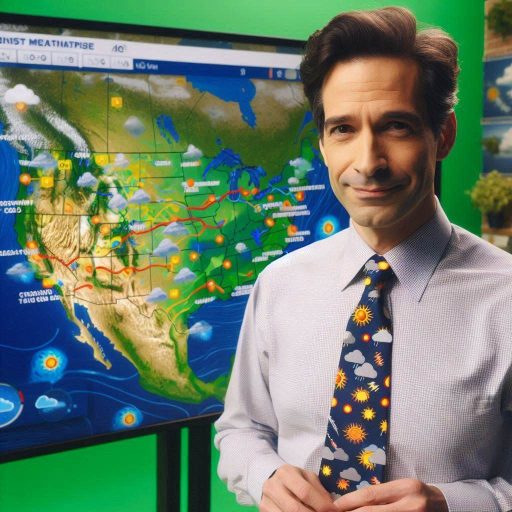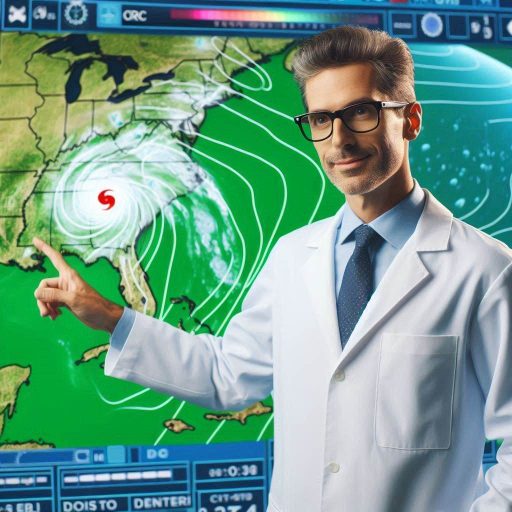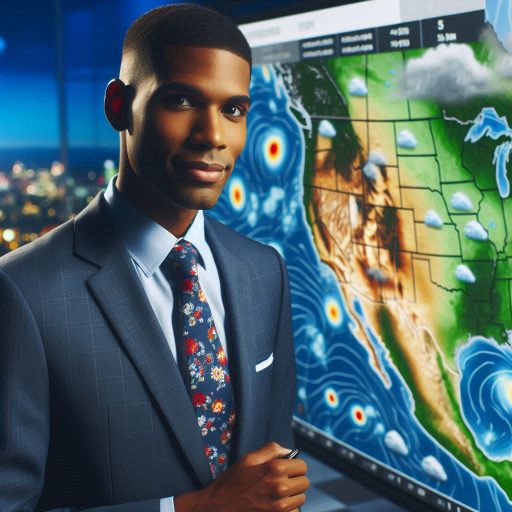Introduction
Becoming a meteorologist is an exciting and impactful career choice for those passionate about weather and climate.
Meteorologists study the atmosphere, analyze weather patterns, and make forecasts that affect daily life, agriculture, transportation, and disaster preparedness.
As our climate continues to change, the role of meteorologists becomes increasingly crucial in helping society understand and adapt to these shifts.
Education plays a vital role in this field.
Most meteorologists hold a bachelor’s degree in meteorology, atmospheric science, or a related field.
This foundational knowledge equips them with essential skills in data analysis, critical thinking, and scientific methodology.
Furthermore, meteorologists must be proficient in various software and technology to analyze data and create accurate forecasts.
In addition to formal education, practical skills are equally important.
Effective communication skills allow meteorologists to convey complex information clearly to the public.
As the demand for accurate weather forecasting continues to rise, aspiring meteorologists must be committed to ongoing education and skill development to succeed in this dynamic field.
Learn About Meteorology
The Definition of Meteorology
Meteorology is the scientific study of the atmosphere.
It focuses on understanding weather patterns and climate behavior.
Meteorologists analyze various atmospheric phenomena, including temperature, humidity, and air pressure.
They seek to predict weather conditions and trends accurately.
Studying meteorology involves a wide range of disciplines.
These include physics, mathematics, and environmental science.
By combining these fields, meteorologists gain a comprehensive understanding of atmospheric processes.
They use this knowledge to assess weather events and climate changes.
Understanding these concepts is crucial for effective weather forecasting.
The Scope and Significance of Studying Meteorology
Meteorology holds significant importance in daily life.
Weather influences many aspects of human activity, such as agriculture, transportation, and emergency planning.
Accurate weather forecasts can save lives and property during severe weather events.
Meteorologists provide essential information to help people prepare for storms, floods, and other hazardous conditions.
The scope of meteorology extends beyond just predicting weather.
It also encompasses climate science, which studies long-term atmospheric trends.
Climate change is a pressing global issue, and meteorologists play a vital role in understanding its impacts.
They analyze data to identify patterns and assess future climate scenarios.
This research helps inform policymakers and the public about necessary actions to mitigate climate change.
Furthermore, meteorology contributes to various industries.
For example, agriculture relies on meteorological data to optimize planting and harvesting schedules.
Airlines use weather information to determine safe flight paths and schedules.
The energy sector depends on accurate weather predictions to manage supply and demand effectively.
To become a successful meteorologist, one must first learn about the field’s foundational principles.
Aspiring meteorologists typically pursue a degree in atmospheric sciences or a related discipline.
A bachelor’s degree provides essential knowledge of meteorological theory and practices.
Many meteorologists continue their education by obtaining a master’s or doctorate degree.
Advanced degrees enable them to specialize in specific areas of research.
In addition to formal education, developing certain skills is crucial.
Meteorologists must be proficient in data analysis and interpretation.
They often use advanced software to model atmospheric conditions and visualize data.
Strong communication skills are also essential.
Meteorologists need to convey complex information clearly to the public and media.
Finally, staying updated on technological advancements is vital.
Meteorology relies heavily on cutting-edge technology, such as satellite imagery and computer simulations.
Understanding these tools allows meteorologists to improve forecasting accuracy continually.
Meteorology is a fascinating and essential field of study.
Its significance extends to various aspects of life, from weather forecasting to climate research.
By pursuing education and developing key skills, individuals can contribute meaningfully to this critical science.
Academic Requirements to Become a Meteorologist
The Educational Path to Becoming a Meteorologist
Becoming a meteorologist typically requires a strong educational foundation.
Most aspiring meteorologists start their journey with a bachelor’s degree in atmospheric science, meteorology, or a related field.
This undergraduate program provides essential knowledge of weather systems, climate dynamics, and data analysis techniques.
Students learn to analyze atmospheric data and develop forecasting skills through a combination of lectures, laboratory work, and field experiences.
Many meteorologists further their education by pursuing a master’s degree or even a doctorate in meteorology or atmospheric sciences.
Advanced degrees allow individuals to specialize in areas such as climate change, severe weather, or remote sensing.
Graduate programs offer in-depth coursework and research opportunities that prepare students for careers in research, academia, or advanced operational forecasting roles.
The Specific Degrees and Coursework Needed in This Field
The specific degrees needed in meteorology vary depending on career goals.
For entry-level positions, a bachelor’s degree is typically sufficient.
Key courses for a bachelor’s degree often include:
- Introduction to Meteorology: Covers fundamental principles of meteorology and atmospheric processes.
- Weather Analysis and Forecasting: Teaches students how to analyze weather data and create forecasts.
- Climatology: Focuses on climate patterns, variability, and change.
- Physical Meteorology: Explores the physical principles governing atmospheric phenomena.
Many programs also require coursework in mathematics and physics.
Classes in calculus, statistics, and differential equations are essential for understanding complex atmospheric models.
Physics courses help students grasp the physical forces at play in the atmosphere.
For those pursuing graduate degrees, additional specialized coursework may include:
- Numerical Weather Prediction: Focuses on using computer models to predict weather conditions.
- Remote Sensing: Covers techniques for observing the atmosphere using satellite and radar data.
- Atmospheric Dynamics: Explores the movements and forces within the atmosphere.
- Tropical Meteorology: Studies weather phenomena specific to tropical regions.
Internships and practical experience are also crucial for meteorology students.
Many programs encourage students to participate in internships with weather agencies, research institutions, or media outlets.
This hands-on experience helps students apply theoretical knowledge in real-world settings and build professional networks.
Becoming a meteorologist requires a solid educational foundation in atmospheric sciences.
A bachelor’s degree is the starting point, often followed by advanced studies and specialized coursework.
By acquiring the necessary academic credentials and practical experience, aspiring meteorologists can prepare for a rewarding career in this dynamic field.
Read: Botany Career Fairs and Networking Events
Gain Practical Experience
Gaining practical experience is crucial for aspiring meteorologists.
Internships and hands-on training provide valuable insights into the field.
They enhance your understanding of meteorological concepts and improve your job prospects.
Many educational programs require students to complete internships as part of their curriculum.
These experiences allow you to apply theoretical knowledge in real-world settings.
The Importance of Internships and Work Experience
Internships help you develop essential skills in data analysis and weather forecasting.
You will learn how to interpret weather models and analyze atmospheric data.
Additionally, you gain experience using meteorological tools and software, which are vital in the industry.
Working alongside professionals also helps you build a network of contacts within the field.
This network can be instrumental when searching for job opportunities after graduation.
Internships also provide insight into daily operations within meteorological organizations.
You will observe how professionals conduct research, make forecasts, and communicate findings.
This firsthand experience allows you to grasp the various roles in meteorology and find your niche.
Furthermore, internships often lead to job offers.
Many organizations prefer hiring candidates with relevant experience.
Tips on How to Secure Hands-On Training in Meteorology
To secure an internship, start by researching organizations that hire meteorology interns.
Consider universities, research institutions, government agencies, and private companies.
Many meteorology programs offer resources for students to find internships.
Utilize your school‘s career services to identify opportunities and receive guidance on applications.
Networking is essential for finding internships.
Attend meteorology conferences, workshops, and local events to connect with professionals.
Engaging with alumni from your program can lead to valuable mentorship and internship opportunities.
Don’t hesitate to reach out to professionals on platforms like LinkedIn.
Express your interest in their work and inquire about potential internships.
Tailor your resume and cover letter for each internship application.
Highlight relevant coursework, skills, and any previous experience.
Be sure to mention your passion for meteorology and your desire to learn.
This demonstrates your commitment and enthusiasm to potential employers.
In addition to formal internships, seek out volunteer opportunities.
Local weather stations, community organizations, or educational institutions often welcome volunteers.
Volunteering can help you gain hands-on experience while contributing to your community.
It also strengthens your resume by showcasing your dedication to the field.
Consider applying for summer research programs in meteorology.
These programs often combine research with practical experience, allowing you to work on projects that interest you.
Many universities and organizations offer competitive summer programs for undergraduate students.
These experiences can enhance your understanding of meteorological research and build your skill set.
Lastly, stay proactive in seeking out opportunities.
Keep an eye on job boards, university postings, and social media for internship announcements.
Many positions fill quickly, so be ready to apply as soon as you find a suitable opportunity.
Gaining practical experience in meteorology is vital to your career development.
Internships and hands-on training equip you with the skills necessary to succeed in this dynamic field.
Read: Preparing for a Botany PhD: Tips and Advice

Develop Technical Skills
Developing technical skills is essential for a successful career in meteorology.
Meteorologists rely on a range of technical competencies to analyze data and make accurate forecasts.
A solid foundation in mathematics and physics is crucial for understanding complex atmospheric processes.
Additionally, strong analytical skills will help you interpret data effectively.
The Specific Technical Skills Required for a Career in Meteorology
Meteorologists must be proficient in data analysis.
This skill involves interpreting large datasets and extracting meaningful insights.
You will often work with various types of data, including satellite images, radar data, and atmospheric models.
Familiarity with statistical methods is also beneficial for conducting research and analyzing trends.
Another critical skill is the ability to create and interpret weather forecasts.
This requires understanding meteorological principles and using different forecasting techniques.
You must also be adept at communicating your findings clearly.
Effective communication is vital when conveying complex weather information to the public or other professionals.
Moreover, meteorologists should possess programming skills.
Proficiency in programming languages, such as Python or R, can significantly enhance your ability to analyze data.
These languages allow you to automate processes and develop custom algorithms for data manipulation.
Familiarity with databases is also beneficial for managing large datasets.
Relevant Software and Tools Used in the Field
Meteorologists use various software and tools to assist in their analyses.
Some of the most common software packages include:
- Weather Simulation Software: Tools like WRF (Weather Research and Forecasting) model allow meteorologists to simulate and predict weather patterns.
- GIS Software: Geographic Information Systems (GIS) software, such as ArcGIS, is crucial for mapping and visualizing meteorological data.
- Data Visualization Tools: Programs like Tableau and MATLAB are used to create visual representations of weather data.
- Statistical Analysis Software: Tools such as SAS or SPSS aid in statistical analysis and modeling.
Meteorologists use these programs to perform in-depth analyses of weather data and identify trends.
Additionally, many meteorologists rely on proprietary weather models provided by meteorological organizations.
These models can forecast weather events and provide critical information for decision-making.
Developing technical skills is vital for anyone pursuing a career in meteorology.
Mastering data analysis, programming, and forecasting techniques will enhance your capabilities.
Familiarizing yourself with relevant software and tools will further prepare you for a successful career in this dynamic field.
Read: Interdisciplinary Research: Botany and Other Sciences
Learn More: Global Water Issues and the Role of Hydrologists
Obtain Certifications and Licenses
Obtaining certifications and licenses is an essential step for aspiring meteorologists.
These credentials validate your expertise and enhance your credibility in the field.
They demonstrate your commitment to professional standards and continuous learning.
Transform Your Career Today
Unlock a personalized career strategy that drives real results. Get tailored advice and a roadmap designed just for you.
Start NowThe Importance of Certifications in Meteorology
Certifications in meteorology serve multiple purposes.
They provide formal recognition of your skills and knowledge, which can improve your job prospects.
Employers often prefer candidates with relevant certifications, as they indicate a higher level of competency.
Certifications can also lead to better job opportunities and higher salaries.
Professional organizations, such as the American Meteorological Society (AMS) and the National Weather Association (NWA), offer certifications for meteorologists.
The AMS offers the Certified Broadcast Meteorologist (CBM) designation, which is particularly valuable for those working in media.
The CBM certification demonstrates proficiency in meteorology and communication skills, making you a more attractive candidate for broadcasting positions.
Additionally, certification helps you stay current with industry trends and advancements.
The requirements for maintaining certification often include continuing education, which ensures that you remain knowledgeable about new techniques and technologies in meteorology.
Obtaining Necessary Licenses for Meteorologists
In addition to certifications, some meteorologists may need to obtain specific licenses.
The need for a license often depends on your career path.
For example, broadcast meteorologists typically require a license to broadcast from the Federal Communications Commission (FCC).
This license ensures compliance with broadcasting regulations.
To obtain the CBM certification from the AMS, you need to meet specific eligibility criteria.
These include a combination of education and professional experience.
You must also pass a rigorous examination that tests your knowledge of meteorological principles and practices.
To maintain your certification, you must participate in ongoing education and professional development.
For those pursuing research or operational meteorology, consider certifications such as the Certified Consulting Meteorologist (CCM) designation offered by the AMS.
This certification is beneficial for meteorologists working in consulting roles or conducting research.
It requires a strong background in meteorology, as well as proof of relevant experience and ongoing education.
Research any specific licensing requirements for your state or region.
Some states have additional regulations for practicing meteorologists, especially in fields such as consulting or private forecasting.
Familiarize yourself with these requirements to ensure compliance.
Obtaining certifications and licenses is crucial for aspiring meteorologists.
These credentials enhance your credibility, improve job prospects, and ensure that you stay current with industry advancements.
Whether you pursue the CBM, CCM, or other relevant certifications, investing in your professional development will pay off in your career.
Read: Women in Botany: Celebrating Pioneers and Leaders
Network with Professionals in the Field
Networking with professionals in the meteorology field is a vital step for aspiring meteorologists.
Building relationships within the industry can open doors to new opportunities, mentorship, and valuable insights.
The connections you make can significantly impact your career trajectory.
The Benefits of Networking for Aspiring Meteorologists
Networking offers numerous benefits for those pursuing a career in meteorology.
First, it provides access to job opportunities that may not be publicly advertised.
Many positions are filled through referrals or recommendations, making connections essential for discovering these hidden opportunities.
Networking can also lead to internships, which are critical for gaining practical experience.
Additionally, building relationships with professionals allows you to learn from their experiences.
Mentorship from established meteorologists can guide your career choices and help you navigate challenges in the field.
Experienced professionals can share insights on industry trends, emerging technologies, and best practices.
This knowledge can enhance your skills and improve your understanding of the field.
Networking also helps you stay updated on professional development opportunities.
Attending industry conferences and events enables you to connect with like-minded individuals.
These gatherings often feature workshops and presentations on the latest advancements in meteorology.
Engaging in these events allows you to grow your knowledge and skills while expanding your professional network.
Tips on How to Connect with Professionals in the Industry
To effectively network with professionals in meteorology, consider the following tips:
- Attend Conferences and Workshops: Participate in meteorology conferences, seminars, and workshops.
- Join Professional Organizations: Become a member of professional organizations, such as the American Meteorological Society (AMS) or the National Weather Association (NWA).
- Utilize Social Media: Use platforms like LinkedIn and Twitter to connect with professionals in the field. Follow meteorologists, organizations, and industry influencers.
- Informational Interviews: Reach out to professionals for informational interviews. Express your interest in their career path and ask for advice.
- Volunteer: Seek volunteer opportunities related to meteorology, such as at local weather stations or community organizations.
- Follow Up: After meeting someone new, follow up with a thank-you message or email.
Express appreciation for their time and insights.
Networking with professionals in the meteorology field is essential for career development.
Building relationships can lead to job opportunities, mentorship, and valuable industry insights.
By attending events, joining organizations, utilizing social media, and engaging in informational interviews, you can effectively connect with professionals and advance your career in meteorology.
Uncover the Details: Differences Between Ecologists and Environmental Scientists
Conclusion
Becoming a meteorologist requires a strong educational foundation and specific skill sets.
Aspiring meteorologists should pursue a relevant degree, such as atmospheric science or meteorology.
This education provides the necessary knowledge of weather patterns, climate systems, and atmospheric processes.
Strong analytical skills are essential for interpreting complex data effectively.
Meteorologists must evaluate various data sources, including satellite imagery and radar information.
Proficiency in computer software for weather modeling and forecasting is also crucial in this field.
These tools allow meteorologists to predict weather patterns accurately and analyze climatic trends.
Gaining experience through internships or volunteer opportunities can enhance practical knowledge and provide valuable networking opportunities.
Hands-on experience allows students to apply theoretical concepts and develop a deeper understanding of meteorological phenomena.
Building effective communication skills helps meteorologists convey information clearly to the public and decision-makers.
Readers should remember that dedication and passion are vital in this field.
Stay curious and engaged with the latest weather trends and technology.
Participate in meteorological societies and attend conferences to expand your knowledge.
By focusing on education and skill development, you can embark on a rewarding career in meteorology.
Pursue your dreams, and make a meaningful impact in understanding our atmosphere and its influence on our daily lives!




